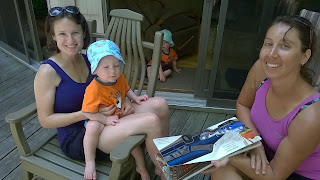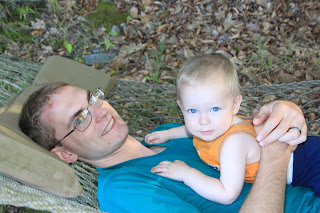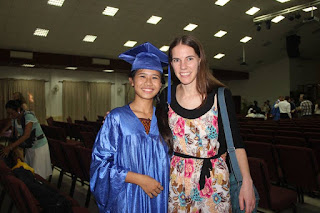"Oh, fun!" the other woman replied. "How old is your daughter?"
My mom cracked up, because the answer is not "eleven." (Note: The original birthday plan was to spend the weekend camping, but the weather had other ideas.)
Some might say I'm a little old to be watching a children's movie. Wikipedia and I beg to differ: L.M. Montgomery's 1908 novel Anne of Green Gables was "written for all ages." And that marathon was the most fun I've had in months. 20 years into my fandom, I'm proof that Anne ages well.
It helps that in the eight-book series... which many fans of the 1980s miniseries have sadly never read... she grows up from an 11-year-old to eventually a grandmother. We see her mellow out, learn from others, endure suffering and loss. At 30, I can relate to her in ways that eluded me at age 10 or 15. She's a more versatile companion than heroines stuck in shorter time frames. Maybe that's why Anne has influenced me more than any other fictional character.
Here are five of my personal values I owe in part to the winsome Anne Shirley (Blythe).

1. Everyday nature is a source of endless wonder.
L.M. Montgomery's enchanting descriptions of landscapes helped Prince Edward Island become a popular tourist destination; it's certainly on my bucket list. But Anne reminds me to look for beauty right where I am. Rolling hills. Rice fields. Rainstorms. It's there, if I only have eyes to see.
"'I want to explore all those fields and lonely places anyhow. I have a conviction that there are scores of beautiful nooks that have never really been seen although they may have been looked at. We'll make friends with wind and sky and rain, and bring home the spring in our hearts.'" (Anne of Avonlea, Ch. 13)
And a scene I've known by heart for years and years: When Gilbert and Anne finally marry, he goes house hunting in a new village without her. He reports to her on the many charms of the home he's chosen.
"'So far, good," said Anne, nodding cautious approval. 'But Gilbert... you haven't yet mentioned one very important thing. Are there trees about this house?'
'Heaps of them, oh, dryad!'
'Oh, I'm so glad! I couldn't live where there were no trees - something vital in me would starve.'" (Anne's House of Dreams, Ch. 2)
I've always felt the same way about trees. Fans debate whether Gilbert is enough of a kindred spirit to merit Anne's heart, but in my book (no pun intended), his "heaps-oh-dryad" response sets the bar pretty high.
2. Don’t be afraid to make mistakes. Or to laugh at them.
"'Marilla, isn't it nice to think that tomorrow is a new day with no mistakes in it yet?'
'I'll warrant you'll make plenty in it," said Marilla. "I never saw your beat for making mistakes, Anne.'
'Yes, and well I know it," admitted Anne mournfully. "But have you ever noticed one encouraging thing about me, Marilla? I never make the same mistake twice.'
'I don't know as that's much benefit when you're always making new ones.'
'Oh, don't you see, Marilla? There must be a limit to the mistakes one person can make, and when I get to the end of them, then I'll be through with them. That's a very comforting thought.'" (Anne of Green Gables, Ch. 21)
'I'll warrant you'll make plenty in it," said Marilla. "I never saw your beat for making mistakes, Anne.'
'Yes, and well I know it," admitted Anne mournfully. "But have you ever noticed one encouraging thing about me, Marilla? I never make the same mistake twice.'
'I don't know as that's much benefit when you're always making new ones.'
'Oh, don't you see, Marilla? There must be a limit to the mistakes one person can make, and when I get to the end of them, then I'll be through with them. That's a very comforting thought.'" (Anne of Green Gables, Ch. 21)
A classic ENFP, Anne is infamous for making flighty mistakes and getting herself into "scrapes." At my party, my dear friend Adrianne had a surprise: she'd recreated the pudding where the mouse drowned when Anne forgot to cover it. We all about died laughing!
My INFJ personality may be more subdued and cautious than Anne's, but I'm every bit as absent-minded, and it's nice having permission just to laugh and move on. After all, what's the alternative: being no-nonsense?
My INFJ personality may be more subdued and cautious than Anne's, but I'm every bit as absent-minded, and it's nice having permission just to laugh and move on. After all, what's the alternative: being no-nonsense?
"'That doesn't sound very
attractive," laughed Anne. "I like people to have a little nonsense
about them.'" (Anne of the Island, Ch. 28)
3. Every kid deserves love and belonging.
Anne is an orphan who has bounced around many homes and asylums before landing at Green Gables. The books definitely gloss over the psychological harm of Anne's affection-starved, tumultuous childhood. I once had an adopted friend who cringed at the way Marilla keeps Anne "on trial" for a while, contingent on good behavior. (It seems to be a cultural norm of the time.) I get her criticism. It's a terrible way to treat a child. But Marilla soon learns, as Matthew has always done, to love Anne unconditionally - quirks, flaws, and all.
While Anne never goes on to adopt children*, she helps raise two young orphaned relatives (Davy and Dora) whom she fiercely loves. And Gilbert urges their daughter Rilla to rise to the occasion and raise the "war orphan" baby she finds until the baby's father returns from World War I. Though not a baby person, Rilla grows attached to little Jims, and matures quite a bit in the process.
Anne and her family are part of the reason why I have always been drawn to kids whose families have been disrupted or unavailable, and why I am passionate about supporting adoption.
*I know Anne adopts a baby in the third movie, "Anne of Green Gables: The Continuing Story." Don't get me started on that movie and how much it departs from the books. Suffice it to say, it was not included in my birthday party.
Anne and her family are part of the reason why I have always been drawn to kids whose families have been disrupted or unavailable, and why I am passionate about supporting adoption.
*I know Anne adopts a baby in the third movie, "Anne of Green Gables: The Continuing Story." Don't get me started on that movie and how much it departs from the books. Suffice it to say, it was not included in my birthday party.
4. Kindred spirits are worth hunting for, maybe even right in front of you.
"'Miss Barry was a kindred spirit after all,' Anne confided to Marilla, 'You wouldn't think so to look at her, but she is. . . Kindred spirits are not so scarce as I used to think. It's splendid to find out there are so many of them in the world.'" (Anne of Green Gables, Ch. 19)
Anne has immortalized the phrase "kindred spirit," which I use all the time with friends. (Many of my friends are avid Anne fans too. Coincidence? I think not.) She also describes people like her best friend Diana Barry as "bosom friends," and in later books adopts the phrase "of the race that knows Joseph." They all refer to people who make something resound in your heart, someone with whom you connect at a deeper level. An ongoing motif with Anne is the discovery of kindred spirits in disguise.
“Anne found it hard to believe that
[Leslie Moore] was the cold, unresponsive woman she had met on the shore – this animated
girl who talked and listened with the eagerness of a starved soul.” (Anne’s
House of Dreams, Ch. 12)
5. Wherever you are, embrace it.
Anne ignores the small-town busybodies who tell her she's a fool to attend university and doom herself to spinsterhood. She bids farewell to friends and family and rejects the advances of Gilbert and others to spend years single, in faraway towns, teaching at various schools, fighting to have her writing published. All this in a culture where women didn't generally make those choices.
When Marilla needs her back at the farm, Anne uncomplainingly returns from college and rolls up her sleeves, continuing her studies by late-night candlelight. Her delight in Green Gables and Marilla is sweeter than ever for all her far-flung adventures, which resume once the farm is in better shape.
Later, when she's convinced that Gilbert really is the man for her, she pours herself into her marriage and family the way she has into all her earlier endeavors.
In each stage, Anne has wistfulness and melodramatic moments and blue days, but her pity parties don't last long. She continues cultivating friendships, serving others, and growing as a person.
When Marilla needs her back at the farm, Anne uncomplainingly returns from college and rolls up her sleeves, continuing her studies by late-night candlelight. Her delight in Green Gables and Marilla is sweeter than ever for all her far-flung adventures, which resume once the farm is in better shape.
Later, when she's convinced that Gilbert really is the man for her, she pours herself into her marriage and family the way she has into all her earlier endeavors.
In each stage, Anne has wistfulness and melodramatic moments and blue days, but her pity parties don't last long. She continues cultivating friendships, serving others, and growing as a person.
"'Miss Stacy told me long ago that by the time I was twenty
my character would be formed, for good or evil. I don't feel that it's what it
should be. It's full of flaws.'
'So's everybody's," said Aunt Jamesina
cheerfully. 'Mine's cracked in a hundred places. Your Miss Stacy likely meant
that when you are twenty your character would have got its permanent bent in
one direction or 'tother, and would go on developing in that line.'" (Anne
of the Island, Ch. 10)
Anne's many influences on me are one reason she's like a dear friend. The other is that whenever I go more than a year or two without her, I just miss her. I've read all 8 books three or four times each, some closer to 10. She's always there when I need her - right there on my bookshelf, offering me whimsy and wisdom. 108 years after she first captivated readers, Anne remains a "kindred spirit" to millions, and I for one don't plan to outgrow her anytime soon.












































